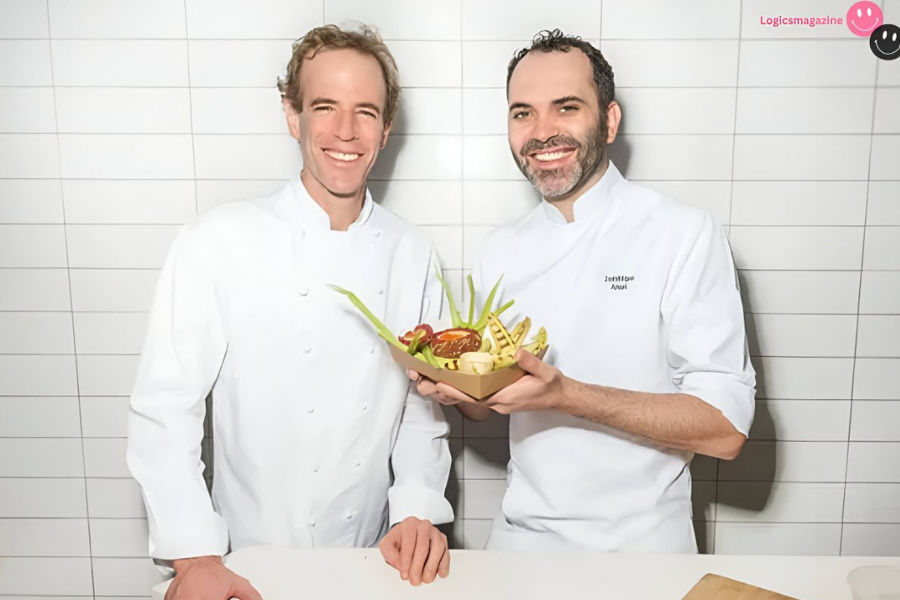Dan Barber Whiting Turner: A Sustainable Vision for Culinary Arts and Construction
Introduction
Dan Barber stands as a luminary in the culinary world, celebrated for his innovative and thought-provoking approaches to farm-to-table dining and sustainable agriculture. As the co-owner of Blue Hill in Manhattan and Blue Hill at Stone Barns, Barber has transformed our understanding of food, championing the significance of locally sourced, environmentally responsible ingredients. The phrase “Dan Barber Whiting Turner” might seem to bridge two distinct realms, yet it embodies a compelling concept when viewed through the prism of sustainability and the evolution of the culinary landscape.
The Philosophy of Dan Barber Whiting Turner
At its core, the “Dan Barber Whiting Turner” philosophy embodies the seamless integration of sustainable practices across both the culinary and construction sectors. For Barber, creating a dining experience that is profoundly rooted in sustainability is paramount. His restaurants are celebrated not only for their exquisite dishes but also for their unwavering commitment to ecological responsibility. This vision resonates deeply with the sustainable building practices championed by Whiting Turner, a prominent construction management firm renowned for its dedication to green building initiatives.
Dan Barber’s Revolutionary Approach to Cuisine
Dan Barber’s culinary philosophy is grounded in the conviction that chefs hold a responsibility to consider the environmental implications of their cooking. At Blue Hill at Stone Barns, Barber has established a distinctive model where the restaurant is intricately linked to the farm, enabling him to oversee the quality and sustainability of the ingredients used. This farm-to-table methodology is a fundamental element of the Dan Barber Whiting Turner ethos, highlighting the necessity of cultivating a harmonious relationship between human consumption and the natural world.
A Commitment to Local Sourcing
Central to Barber’s approach is the commitment to sourcing ingredients locally. By forging partnerships with nearby farmers and producers, he ensures that the menu reflects seasonal offerings while reducing the carbon footprint associated with transportation. This practice not only supports local economies but also fosters a deeper connection between diners and the food they consume. When patrons dine at Blue Hill, they are not merely enjoying a meal; they are partaking in a story of local agriculture and sustainable practices.
Whiting Turner’s Commitment to Sustainable Building
While Whiting Turner primarily operates within the construction sector, its unwavering commitment to sustainability mirrors the principles that Barber advocates. The firm specializes in green building projects that minimize environmental impact and champion sustainable practices. This encompasses the use of energy-efficient materials, waste reduction strategies, and the implementation of eco-friendly construction methods. The alignment between Barber’s culinary practices and Whiting Turner’s construction strategies exemplifies a shared dedication to preserving our natural resources for future generations.
The Importance of Green Building
Green building is more than just a trend; it represents a necessary shift in how we approach construction and architecture. Whiting Turner’s focus on energy efficiency not only contributes to lower operating costs for buildings but also plays a crucial role in mitigating the impacts of climate change. By constructing buildings that are designed to be sustainable from the ground up, Whiting Turner is paving the way for a future where the built environment harmonizes with nature rather than detracting from it.
The Connection Between Dan Barber Whiting Turner and Sustainable Practices
The concept of “Dan Barber Whiting Turner” emerges as a fascinating intersection between the culinary arts and sustainable construction. Both Dan Barber and Whiting Turner serve as trailblazers in their respective fields, advocating for the importance of sustainability. For Barber, this entails raising public awareness about sustainable agriculture and the significance of eating seasonally and locally. In contrast, Whiting Turner emphasizes the creation of energy-efficient, environmentally friendly buildings. Together, they exemplify a holistic approach to sustainability that transcends traditional industry boundaries.
A Model for Interdisciplinary Collaboration
The collaboration between culinary and construction industries under the “Dan Barber Whiting Turner” umbrella serves as a model for interdisciplinary cooperation. By bringing together chefs and architects, we can create spaces that enhance the dining experience while promoting sustainable practices. This synergy not only elevates the quality of food served but also ensures that the environments in which we dine are conducive to sustainability.
Innovations in Sustainable Dining Spaces
Imagine a scenario where the principles championed by Dan Barber and Whiting Turner coalesce to create sustainable dining environments. Picture a restaurant designed by Whiting Turner that incorporates sustainable materials, energy-efficient systems, and technologies aimed at minimizing waste. Such a space would perfectly complement Barber’s commitment to utilizing locally sourced ingredients and reducing food waste. A dining establishment that embodies the values of “Dan Barber Whiting Turner” would set a new benchmark for sustainability within the culinary realm, offering a comprehensive experience that fuses sustainable architecture with responsible dining.
Designing for the Future
Designing sustainable dining spaces involves more than just aesthetics; it requires a thoughtful approach to materials, energy use, and waste management. By integrating smart design principles, restaurants can create environments that not only delight the senses but also align with sustainability goals. This includes the use of recycled materials, efficient energy systems, and designs that enhance natural light and ventilation. As the culinary landscape evolves, the need for dining spaces that reflect a commitment to sustainability becomes increasingly crucial.
Educating the Next Generation on Sustainability
A vital aspect of the Dan Barber Whiting Turner philosophy is education. Barber has been a passionate advocate for educating the public and aspiring chefs about the importance of sustainability in culinary practices. He has extensively discussed the need for a culinary revolution that prioritizes environmental considerations. Similarly, Whiting Turner dedicates significant resources to educating its clients and stakeholders about the advantages of green building practices. By cultivating a culture of sustainability, both Barber and Whiting Turner are laying the groundwork for a more environmentally responsible future.
Fostering Future Leaders
As we look to the future, it is essential to nurture the next generation of culinary leaders who understand the significance of sustainability. Educational initiatives that focus on sustainable agriculture, eco-friendly cooking techniques, and responsible sourcing will empower young chefs to make informed decisions in their kitchens. By integrating sustainability into culinary education, we can inspire a new wave of chefs who are not only skilled in their craft but also deeply committed to the well-being of the planet.
The Impact of Dan Barber Whiting Turner on the Culinary Industry
The influence of the “Dan Barber Whiting Turner” philosophy on the culinary industry is profound and far-reaching. Barber has not only transformed how chefs approach ingredients but has also reshaped operational practices within restaurants. By placing sustainability at the forefront, he encourages other chefs to consider the environmental impact of their kitchens. The “Dan Barber Whiting Turner” approach represents a comprehensive strategy for sustainability, enabling culinary professionals to expand their thinking beyond the kitchen and contemplate the entire ecosystem in which they function.
Inspiring Change Across the Industry
Barber’s work serves as an inspiration for chefs and restaurateurs around the world. By demonstrating that sustainable practices can coexist with exceptional culinary experiences, he challenges the notion that sustainability is an impediment to creativity and flavor. The ripple effect of his philosophy can be seen in restaurants that prioritize local sourcing, reduce food waste, and implement sustainable business practices. As more chefs adopt these principles, the culinary industry as a whole becomes more aligned with the values of sustainability.
A Vision for the Future: Dan Barber Whiting Turner
Looking ahead, the concept of Dan Barber Whiting Turner envisions a future where sustainability is an integral consideration within both the culinary and construction fields. Imagine a world where every restaurant is designed with sustainability in mind, from ingredient sourcing to building practices. This vision is not merely aspirational; it is increasingly imperative as we confront the challenges posed by climate change and resource depletion. The “Dan Barber Whiting Turner” philosophy serves as a blueprint for a more sustainable future, where every decision made is informed by environmental considerations.
A Call to Action
As we envision this future, it is essential for individuals and organizations to actively participate in fostering sustainability. From chefs to builders, every sector has a role to play in creating a more sustainable world. By prioritizing eco-friendly practices, supporting local economies, and educating the next generation, we can collectively contribute to a more sustainable future for all.
FAQs
What is the Dan Barber Whiting Turner concept?
The Dan Barber Whiting Turner concept represents the intersection of sustainable culinary practices and green building initiatives, promoting environmental responsibility in both food sourcing and construction.
How does Dan Barber promote sustainability in his restaurants?
Dan Barber emphasizes locally sourced ingredients, fosters partnerships with nearby farmers, and practices a farm-to-table methodology, ensuring a sustainable dining experience.
What role does Whiting Turner play in sustainable construction?
Whiting Turner is a construction management firm dedicated to sustainable building practices, focusing on energy efficiency, waste reduction, and eco-friendly materials.
How can culinary and construction industries collaborate for sustainability?
By integrating sustainable design in dining spaces and promoting eco-friendly practices, culinary and construction industries can enhance dining experiences while reducing environmental impacts.
Why is education important in the Dan Barber Whiting Turner philosophy?
Education helps cultivate a culture of sustainability, empowering chefs and builders to make informed decisions that prioritize environmental considerations in their work.
Conclusion
In conclusion, the “Dan Barber Whiting Turner” concept represents an exciting convergence of culinary arts and sustainable construction. By intertwining the principles of sustainable agriculture with green building practices, Dan Barber and Whiting Turner underscore the significance of a holistic approach to sustainability. This philosophy encourages us to transcend traditional boundaries and explore how diverse industries can collaborate to forge a more sustainable world. Whether through a meal crafted with locally sourced ingredients or a building designed to minimize environmental impact, the principles of Dan Barber Whiting Turner remind us that every choice we make is vital in the pursuit of a sustainable future. Together, we can cultivate a world where sustainability is not just an ideal but a reality woven into the fabric of our daily lives.
Uncover juicy celebrity rumors and entertainment updates on SyncTimes.co.uk.






